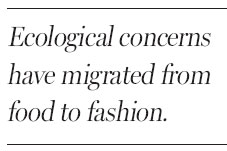Wearing our conscientiousness on our sleeves
Updated: 2012-03-25 07:44
By Anita Patil (The New York Times)
|
|||||||||||
Check the label: It's organic, vegan, of European origin and has a carbon footprint equivalent to driving a car for 18 kilometers. No, it's not a pear or an eggplant at the market, rather a linen jersey knit dress by the brand Honest by.
It's "the world's first 100 percent transparent company," the Belgian designer Bruno Pieters told The Times. His avant-garde brand, which is mostly sustainable and organic, made its debut on January 30.
 |
How something is made, where a product comes from and whether it is good for the environment and ourselves are no longer issues just for the food we consume. The fashion world is asking the same questions, hoping that our concerns extend to the clothing we wear. A pair of vegan boots used to be hard to find, never mind attractive. But now, luxury fashion, designers and mass-market retailers are making a stylish mark in a responsible way.
Honestby.com has filters for clothing criteria like recycled or vegan. The details of each supplier are listed, including the number of employees and the assembly and cutting time. If that isn't enough documentation, enviro-conscious buyers can check out the details on organic certification, transportation costs and the carbon footprint.
Wanting to create a line produced with the least possible harm to people, animals and the environment, Mr. Pieters took a year to vet suppliers, many of them in Europe, he told The Times, where health and safety standards are vigilantly policed. The clothing is expensive - that organic linen jersey knit dress is about $840 - but 20 percent of the profits go to charity.
The feel-good/do-good shopping experience extends to upscale department stores like Nordstrom, which is also experimenting with retail philanthropy. Last year it opened Treasure&Bond in downtown New York, where all profits from the Afghan kilim rugs, chunky jewelry and Princess Beatrice-like fascinators it sells will go to children's charities.
 |
In eco-conscious London, "upcycling" was the buzzword during fashion week last month. Estethica, a display of reclaimed and sustainable clothing, featured work from students at Central Saint Martins, who created clothes from the thread spools and fabric remnants from the bottom of factory machines. Christopher Raeburn, a founding member of Estethica, told The Times: "I think you have a real obligation to sustainability if you are a young designer."
In Detroit, designers are taking it a step further by making clothing that will benefit some of the city's more than 20,000 homeless people. Stephen Schock, a professor at the College for Creative Studies, started a design activism class in 2010 with the simple instructions: "Design to fill a need."
Veronika Scott, then a junior, created an insulated coat for the homeless that could double as a sleeping bag while outside. After graduating in December, Ms. Scott founded Empowerment Plan, a nonprofit company, where she trains and pays homeless women to produce the coats, which the Red Cross has also shown interest in.
Clothing is morphing into something more than just a fashion statement, one that's environmentally and socially responsible, too. The next generation of consumers are taught about provenance and sustainability in schools in Northern Europe, Loran Hall, a retail analyst, told The Times, adding: "If you're a brand that wants to stick around, you have to examine this stuff now."
For comments, write to nytweekly@nytimes.com
The New York Times
Today's Top News
Rescuers race against time for quake victims
Telecom workers restore links
Coal mine blast kills 18 in Jilin
Intl scholarship puts China on the map
More bird flu patients discharged
Gold loses sheen, but still a safe bet
US 'turns blind eye to human rights'
Telecom workers restore links
Hot Topics
Lunar probe , China growth forecasts, Emission rules get tougher, China seen through 'colored lens', International board,
Editor's Picks

|

|

|

|

|

|





